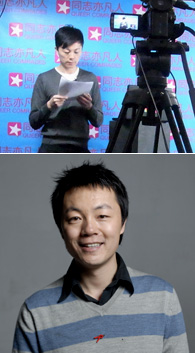In this final installment of Fridae's LGBT People to Watch 2010 series, we put the spotlight on Georgia Kuo, founder and head of "LGBT In and Out Parents Association", the only support group for parents of LGBT individuals in Taiwan; and Xiaogang Wei, founder, director and host of Queer Comrades, China’s only independent LGBT webcast.
Xiaogang Wei
A landmark event was celebrated in Beijing in April this year when China’s only independent LGBT webcast turned three years old.

With more than 40 episodes under their belt, Queer Comrades delved into subject matter that mainland Chinese media have never dared to tackle before. Diverse topics as coming out, the “pink dollar”, fag hags, LGBT families, drag culture and HIV have all been covered in the webcasts.
Despite being based in Beijing, the Queer Comrades crew have been careful not to limit their scope to life in the capital city. “A lot of the people we interview bring stories and insights from their respective homeplaces in China,” Wei explains. So far, the series has taken its regular viewers on journeys to Xinjiang, Suzhou, Shanghai, Guangzhou and Tianjin. News and events from the worldwide LGBT community has also been featured, including most recently, coverage from Surabaya, Indonesia which saw the International Gay and Lesbian Association’s regional conference cancelled due to pressure from religious fundamentalists.
The inspiration for Queer Comrades came to Wei in 2005 after he worked on the film “Living Positive”. This educational docudrama, based on real-life stories was the first of its kind in China – People Living with HIV/AIDS (PLHIV) were involved in the production and acting process. This experience convinced Wei about the power of broadcast media to “create social change”. From then, the road to create Queer Comrades began.
In the last 12 months, Macau-born, Beijing-based Eva Lee joined the show and shares hosting duties with the other gay male hosts. The arrival of Lee brought a new dimension to Queer Comrades and allows “more profound insight in the lesbian world” which Wei admits the show lacked in previous years.
Wei has kept the momentum going a rapid pace. He has wrangled support from the likes of Ford Foundation of the U.S, as well are partners such as the British Embassy in Beijing who recently tapped Queer Comrades to help mark the International Day Against Homophobia.
Maintaining independence has been pivotal their success, not to mention a keen awareness of how to play within China’s tricky media landscape, even in cyberspace. Wei admitted recently in Chinese media that Queer Comrades has no choice but to exercise self-censorship and tries not to “push the envelope too far”.
However without people like Wei and the Queer Comrades team who are willing to tread that fine line, the estimated 30 million of Chinese gays and lesbians, would few chances to see homegrown stories of LGBT life within China.
æ: Why do you do this work?
Wei: As queer issues are at the forefront of social debate in China’s present-day society, I believe that the need for information about LGBT and sexual health issues will continue to grow during the coming years.
I think it’s important to inform both LGBT and non-LGBT members of Chinese society in a relaxed and unrestrained way on the various aspects of queer culture, and sending out empowering images of queer life is a great way to do this.
æ: How do you think you can make positive change happen in 2010?
Wei: By continuing to use Queer Comrades as a means to increase the visibility of the LGBT community and appreciate its intricacies in- and outside of China.
æ: What is your message to people who stand in your way?
Wei: Understand before you judge.
Wei Xiao Gang can be contacted at www.queercomrades.com
With contributions from Laurindo Garcia, Patty Tumang and Sylvia Tan.
(ILGA) conference scheduled to be held on March 26-28, 2010 in
Surabaya, Indonesia, ended before it could start. Conference participants
were threatened by religious fundamentalist led by the Islamic Defenders
Front (FPI), and the conference organisers were forced to cancel the conference.
